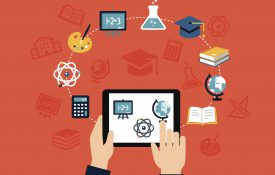-
Workplace Support Helps Parents Make More Time for Their Kids
Between juggling responsibilities at home and the office, working parents often report feeling stressed over conflicting demands on their time. Employees who were part of a new study on reducing work-family conflict reported spending significantly more time with their kids without reducing their number of working hours. An interdisciplinary team of behavioral researchers carried out the study as part of a larger initiative undertaken by The National Institutes of Health and the Centers for Disease Control and Prevention called the Work, Family and Health Study with the goal of improving the health of workers and their families, while also benefiting employers.
-
Learning Through Observation
The famous Bobo doll experiment showed that children learn through observation, not just through reward and punishment. In that classic study, Albert Bandura showed that children who had watched adults beat an inflatable clown doll learned to model the same aggressive behavior. This study marked an important shift in the field of psychology toward a social–cognitive model of learning. For almost 60 years, Bandura’s work in the fields of social and cognitive psychology has served as a foundation for research on topics ranging from moral judgment to the effects of media violence.
-
New Research From Psychological Science
Read about the latest research published in Psychological Science: Failing to Forget: Inhibitory-Control Deficits Compromise Memory Suppression in Posttraumatic Stress Disorder Ana Catarino, Charlotte S. Küpper, Aliza Werner-Seidler, Tim Dalgleish, and Michael C. Anderson People with posttraumatic stress disorder (PTSD) often experience intrusive memories and flashbacks; however, research has suggested that, to different degrees, people are able to voluntarily suppress these types of unwanted memories. People with and without PTSD who had experienced a past trauma completed a think/no-think task in which they studied cue images paired with traumatic scenes.
-
Teen Brains Shift Gears on Risk with Mom Watching
From dangerous driving to drug use, numerous studies have shown that teens are far more likely to engage in a slew of risky behaviors when they’re with peers than when they’re alone. For example, studies conducted by Laurence Steinberg of Temple University demonstrated that teens—who are already among the most risk-prone drivers to begin with—are even more likely to take risks behind the wheel when peers are present. However, new research from a team of psychological scientists from the University of Illinois demonstrates that parents, as well as peers, can also significantly influence a teen driver’s behavior.
-
Optimism for Technology May Bias Financial Decisions
Facebook claims more than 1 billion users, and Apple is widely cited as the world’s most valuable company. Constant technological innovation over the past few decades influences almost every aspect of our daily lives. However, new research suggests that you may want to think twice before betting on the next high-tech trend.
-

Science of Learning Can Help Parents, Developers Grade Educational Apps
A comprehensive research report provides an evidence-based guide that parents, educators, and app designers alike can use to evaluate the quality of so-called “educational” apps.

